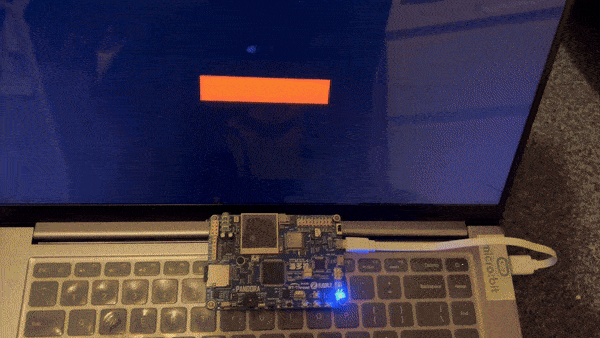$ west flash
$ st-info --probe
$ st-flash --connect-under-reset write build/zephyr/zephyr.bin 0x8000000$ pyocd list
$ pyocd flash -t stm32l475xe -a 0x8000000 build/zephyr/zephyr.bin
Step 1: Install Zephyr
$ pip install west
$ west init ~/zephyrproject
$ cd ~/zephyrproject
$ west update
$ west zephyr-export
$ pip install -r ~/zephyrproject/zephyr/scripts/requirements.txt
$ echo "source ~/zephyrproject/zephyr/zephyr-env.sh" >> ~/.bashrc
Step 2: Install Zephyr-SDK
$ cd ~
$ wget https://github.com/zephyrproject-rtos/sdk-ng/releases/download/v0.16.8/zephyr-sdk-0.16.8_linux-x86_64.tar.xz
$ wget -O - https://github.com/zephyrproject-rtos/sdk-ng/releases/download/v0.16.8/sha256.sum | shasum --check --ignore-missing
$ tar xvf zephyr-sdk-0.16.8_linux-x86_64.tar.xz
$ cd zephyr-sdk-0.16.8
$ ./setup.sh
$ sudo cp ~/zephyr-sdk-0.16.8/sysroots/x86_64-pokysdk-linux/usr/share/openocd/contrib/60-openocd.rules /etc/udev/rules.d
$ sudo udevadm control --reload-rules
$ sudo udevadm trigger
Step 3: Hello-World Example
$ git clone https://github.com/wuhanstudio/stm32l475-zephyr-bsp
$ cd stm32l475-zephyr-bsp/hello_world
$ source ~/zephyrproject/zephyr/zephyr-env.sh
$ west build -b pandora_stm32l475
$ west flash
Step 4: Add modules (Optional)
$ west build -b pandora_stm32l475 -t menuconfig
Subsystems and OS Services --->
[*] Shell --->
Device Drivers --->
[*] General-Purpose Input/Output (GPIO) drivers --->
[*] GPIO Shell
[*] Inter-Integrated Circuit (I2C) bus drivers --->
[*] I2C Shell
[D] Save minimal config (advanced)
$ cat build/zephyr/kconfig/defconfig > prj.conf
$ west build -b pandora_stm32l475 -p
$ west flash
- i2c device tree: https://github.com/zephyrproject-rtos/zephyr/blob/main/dts/arm/st/l4/stm32l4.dtsi
- gpio pinctrl definition: https://github.com/zephyrproject-rtos/hal_stm32/blob/main/dts/st/l4/stm32l475v(c-e-g)tx-pinctrl.dtsi
$ source ~/zephyrproject/zephyr/zephyr-env.sh
$ cd hello_world
$ west build -b pandora_stm32l475
$ west flash
Change GPIO pin output and scan I2C bus:
# LED: PE8
uart:~$ gpio conf gpio@48001000 8 o
uart:~$ gpio set gpio@48001000 8 0
uart:~$ gpio set gpio@48001000 8 1
# I2C3: i2c3_scl_pc0 &i2c3_sda_pc1
uart:~$ i2c scan i2c@40005c00
0 1 2 3 4 5 6 7 8 9 a b c d e f
00: -- -- -- -- -- -- -- -- -- -- -- --
10: 10 -- -- -- -- -- -- -- -- -- -- -- -- -- 1e --
20: -- -- -- -- -- -- -- -- -- -- -- -- -- -- -- --
30: -- -- -- -- -- -- -- -- -- -- -- -- -- -- -- --
40: -- -- -- -- -- -- -- -- -- -- -- -- -- -- -- --
50: -- -- -- -- -- -- -- -- -- -- -- -- -- -- -- --
60: -- -- -- -- -- -- -- -- 68 -- -- -- -- -- -- --
70: -- -- -- -- -- -- -- --
3 devices found on i2c@40005c00
- spi device tree: https://github.com/zephyrproject-rtos/zephyr/blob/main/boards/shields/st7789v_generic/st7789v_tl019fqv01.overlay
$ source ~/zephyrproject/zephyr/zephyr-env.sh
$ cd hello_st7789
$ west build -b pandora_stm32l475
$ west flash
$ source ~/zephyrproject/zephyr/zephyr-env.sh
$ cd hello_lvgl
$ west build -b pandora_stm32l475
$ west flash
Step 1: Build MCUBoot (bootloader)
$ git clone https://github.com/mcu-tools/mcuboot
$ cp mcuboot.overlay mcuboot/boot/zephyr/app.overlay
$ cp mcuboot.conf mcuboot/boot/zephyr/prj.conf
$ source ~/zephyrproject/zephyr/zephyr-env.sh
$ cd mcuboot/boot/zephyr
$ west build -b pandora_stm32l475
$ west flash
Step 2: Build Zephyr Application
$ source ~/zephyrproject/zephyr/zephyr-env.sh
$ cd hello_mcuboot
$ west build -b pandora_stm32l475
# Write the firmware to slot1
$ west flash
$ pyocd flash -t stm32l475xe -a 0x8010000 build/zephyr/zephyr.signed.confirmed.bin
# Write the firmware to slot2
$ pyocd flash -t stm32l475xe -a 0x8028000 build/zephyr/zephyr.signed.confirmed.bin
# Optional: Manually sign the firmware and write to slot2
$ ../mcuboot/scripts/imgtool.py sign -k ../mcuboot/root-rsa-2048.pem build/zephyr/zephyr.bin build/zephyr/zephyr.signed.test.bin -v 0.0.1 --pad --header-size 0x200 --slot-size 0x18000
$ pyocd flash -t stm32l475xe -a 0x8028000 build/zephyr/zephyr.signed.test.bin
Please wait for this PR to be merged: zephyrproject-rtos/zephyr#79465
$ source ~/zephyrproject/zephyr/zephyr-env.sh
$ cd hello_icm20608
$ west build -b pandora_stm32l475
$ west flash
$ pip install pyserial pygame pyopengl
$ python cube.py
$ source ~/zephyrproject/zephyr/zephyr-env.sh
$ cd hello_sdcard_fs
$ west build -b pandora_stm32l475
$ west flash
List all files on the SD card:
*** Booting Zephyr OS build v3.7.0-3953-g1bbeeadfbf43 ***
[00:00:00.032,000] <inf> main: Block count 3934208
Sector size 512
Memory Size(MB) 1921
[00:00:00.064,000] <inf> sd: Maximum SD clock is under 25MHz, using clock of 24000000Hz
Disk mounted.
[00:00:00.100,000] <inf> sd: Maximum SD clock is under 25MHz, using clock of 24000000Hz
Listing dir /SD: ...
[FILE] VERSION.ASP (size = 215)
[FILE] INDEX~1.HTM (size = 0)
[DIR ] WEBNET
uart:~$
A very useful post that explains how to flash AT firmware v2.2 to ESP8266:
(The official released firmware won't work because RX/TX pins were changed for some reason)
https://www.sigmdel.ca/michel/ha/esp8266/ESP01_AT_Firmware_en.html
$ source ~/zephyrproject/zephyr/zephyr-env.sh
$ cd hello_at_wifi
$ west build -b pandora_stm32l475
$ west flash
# Start the HTTP server and listening on port 8000
$ python http-server.py
Connect to a WIFI and show IP addresses:
[00:00:00.100,000] <inf> wifi_esp_at: Waiting for interface to come up
[00:00:00.549,000] <inf> wifi_esp_at: AT version: 2.2.0.0(s-b097cdf - ESP8266 - Jun 17 2021 12:58:29)
[00:00:00.551,000] <inf> wifi_esp_at: SDK version: v3.4-22-g967752e2
[00:00:00.558,000] <inf> wifi_esp_at: Bin version: 2.2.0(ESP8266_1MB)
[00:00:01.041,000] <inf> wifi_esp_at: ESP Wi-Fi ready
[00:00:01.041,000] <dbg> net_tcp: net_tcp_init: (0x20002f98): Workq started. Thread ID: 0x20002078
*** Booting Zephyr OS build v3.7.0-4340-gb5229c99dbec ***
uart:~$ wifi scan
uart:~$ wifi connect -s "<SSID>" -k 1 -p PASS_WORD
uart:~$ net ipv4
IPv4 support : enabled
IPv4 fragmentation support : disabled
IPv4 conflict detection support : disabled
Max number of IPv4 network interfaces in the system : 2
Max number of unicast IPv4 addresses per network interface : 1
Max number of multicast IPv4 addresses per network interface : 2
IPv4 addresses for interface 1 (0x200009e4) (IP Offload)
======================================================
Type State Ref Address
DHCP preferred 1 192.168.1.106/255.255.255.0
IPv4 addresses for interface 2 (0x20000aec) (Dummy)
=================================================
Type State Ref Address
autoconf preferred 1 127.0.0.1/255.0.0.0
Known issue (solved): zephyrproject-rtos/zephyr#75345
Solution: Change the write command to 0x32.
The default value: PP_1_4_4 uses the write command 0x38, which is not supported by w25q128jv.
&w25q128jv {
writeoc = "PP_1_1_4";
}
$ source ~/zephyrproject/zephyr/zephyr-env.sh
$ cd hello_qspi_flash
$ west build -b pandora_stm32l475
$ west flash
Use UART1 for console output and USB CDC (ACM) for Zephyr shell.
/ {
chosen {
zephyr,console = &usart1;
zephyr,shell-uart = &cdc_acm_uart0;
};
};
$ source ~/zephyrproject/zephyr/zephyr-env.sh
$ cd hello_usb_cdc
$ west build -b pandora_stm32l475
$ west flash

